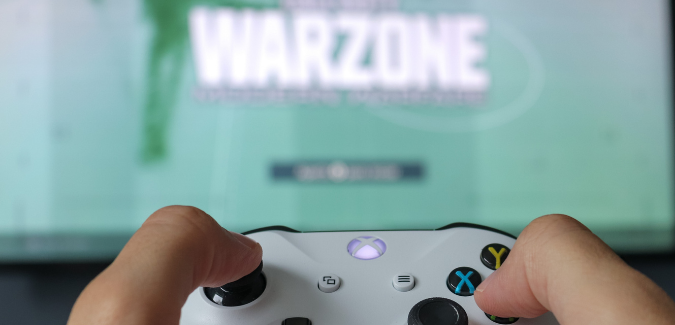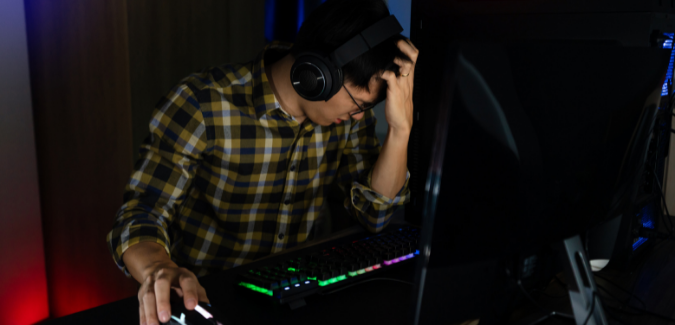When it comes to the concern of video games and the time spent on them, many have wondered about the impact that they can have on a person’s mental health. There has been a correlation between violent video games and signs of aggression, which raises another important question: Is there a direct connection between gaming and depression?
To fully understand the connection between video games and depression, we need to understand them individually. Here we go into the world of video games, video game addiction, and their impacts on overall mental health.

What is a video game?
The simple answer is that video games are digital entertainment that implements mental, emotional, and physical interaction. Video games can be played on a computer, game console, phone, or even tablet.
The ten most relevant video game categories today and examples:
- Sandbox – Grand Theft Auto
- Real-time Strategy (RTS) – Age of Empires
- First-person shooter (FPS) – Halo
- Third-person shooter (TPS) – Gear of War
- Multiplayer online battle arena (MOBA) -League of Legends
- Role-playing (RPG) – Fallout 4
- Simulation and sports – Madden NFL
- Puzzlers – Portal 2
- Party Games – Jackbox Party Pack
- Action-adventure – Assassin’s Creed
- Survival and horror – Resident Evil
- Platformer – Crash Bandicoot

What is Depression:
Depression (major depressive disorder or clinical depression) is a common but serious mood disorder. It causes severe symptoms that affect how you feel, think, and handle daily activities, such as sleeping, eating, or working. (Depression, n.d.) To be diagnosed with depression, the symptoms must be present for at least two weeks.
Symptoms of Depression:
- Feeling sad or having a depressed mood
- Loss of interest or pleasure in activities once enjoyed
- Changes in appetite — weight loss or gain unrelated to dieting
- Trouble sleeping or sleeping too much
- Loss of energy or increased fatigue
- Increase in purposeless physical activity (e.g., inability to sit still, pacing, handwringing) or slowed movements or speech (these actions must be severe enough to be observable by others)
- Feeling worthless or guilty
- Difficulty thinking, concentrating, or making decisions
- Thoughts of death or suicide
The relationship between video games and depression:
It is becoming more evident that the relationship between video games and depression is real and very significant. While researchers are still studying video game addiction to understand better how excessive gaming can impact people, it is already known that screen time has been linked to depression.
Professor Thomas Joiner, who teaches at Florida State University, states that screen time should be considered a modern-day risk factor for depression and suicide.
“There is a concerning relationship between excessive screen time and risk for death by suicide, depression, suicidal ideation, and suicidal attempts,” says Joiner, who researched with psychology Professor Jean Twenge of San Diego State University. “All of those mental health issues are very serious. (Social Work Today, n.d.) I think it’s something parents should ponder.”

Why do video games cause depression?
- The constant “online” feeling causes people to feel disconnected.
- Loss of face-to-face and meaningful interactions.
- The screen or game does not provide the relationship the individual is looking for, which causes them to feel lonely.
- Causes consequences to family and friend relationships.
- Promotes sedentary behavior
Takeaways:
In conclusion, video games do have a direct connection to depression.
Those who study the human brain and its functioning in disorders have found that the same areas of the brain had abnormal functioning in both depression and gaming disorders. The amygdala, prefrontal cortex, gyrus, and the connection between the frontoparietal lobe and the amygdala are disrupted in the same way in addicted gamers and people with depression. (htt1)
Gamers who have developed depression will turn back towards the game to have a way to escape their symptoms. Negative emotions, thoughts, moods, and behavior will all be affected, and they will see gaming as a pro and no longer as a con. This becomes an even bigger issue because they can become lost in the virtual world and not want to return to the real world to deal with their situation.
When it comes down to it, long hours spent without exercise or much movement at all, nutrition and hydration that are often poor, lack of significant interaction with real-world people, and an intense focus on the game’s content can all contribute to the development of depression.
There is no wrong way to start when it comes to treatment for gaming disorders or depression.
The most important thing is to begin by taking the first step and seeking help.
At Omega Recovery, we offer our clients the latest in addiction and mental health treatment through our community integrated treatment program. Traditional substance abuse treatment centers put the struggling individual in an artificial treatment bubble where it’s relatively easy to stay sober. Still, inevitably when that client leaves treatment, they are unprepared to deal with the stress of everyday life. In this “community integration” model, the clients get to experience life; shopping in the supermarket, going on a barbeque, going to a doctor’s appointment, going on a job interview, all with staff supervision and clinical staff that can help process all the feelings and emotions that can so often arise in early recovery.
OMEGA Recovery offers Gaming and Depression Treatment
If you are looking for one of the best evidence-based, most immersive, and transformative treatment programs in the United States, Omega Recovery is it!
What we offer at our center:
- Cognitive Behavioral Therapy
- Dialectical Behavior Therapy
- Peer Recovery Coaching
- Nature Immersion
- Outdoor Behavioral Health
- Narrative Therapy and the “Hero’s Journey”
- Mindfulness
- Yoga and Somatic Techniques
Read more about video game addiction here: Click Here
Read more about depression here: Click Here
If you or someone you love is struggling and needs addiction or mental health treatment, please reach out to us today! You can contact us when you are ready at (512) 690-4913 or send us an e-mail at intake@omegarecovery.org.




